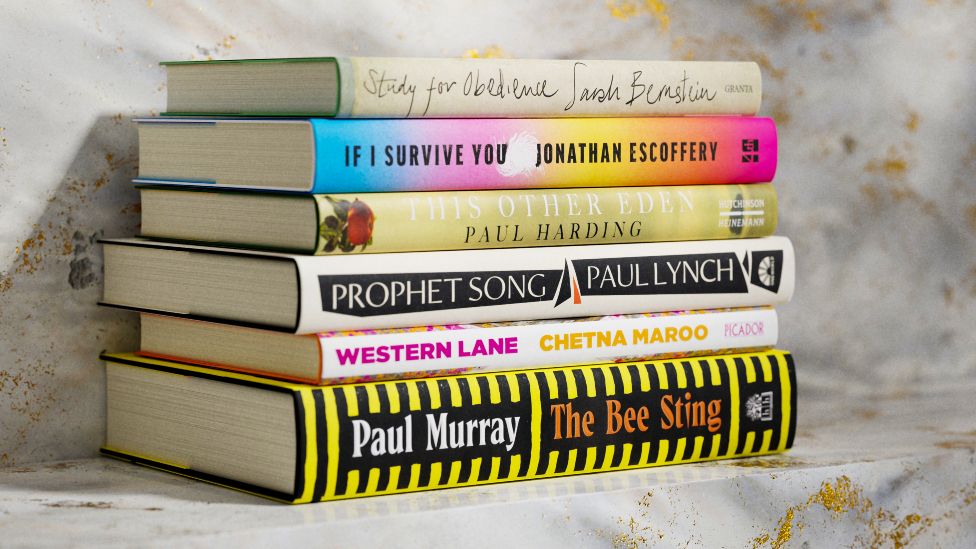
This year’s Booker Prize was won by Irish author Paul Lynch for Prophet Song, a dystopian vision of Ireland in the grips of totalitarianism.
Find out more about it and the other five nominees who were vying for the £50,000 prize:
Prophet Song – Paul Lynch
The story: Prophet Song depicts an Ireland in the grip of a totalitarian regime some time perhaps in the near future. The Stack family are grappling with a terrifying new world in which the democratic norms they are used to begin to disappear.
The novel asks big questions of the reader. When would you leave as your country slides into authoritarianism? Would you put your family in danger to fight back? Lynch says the origins of his story lay in the Syrian war and the refugee crisis that followed.
The book is also a reflection of the populism and nationalism sweeping much of the world now. Even the lack of any paragraph breaks adds to the claustrophobic atmosphere.
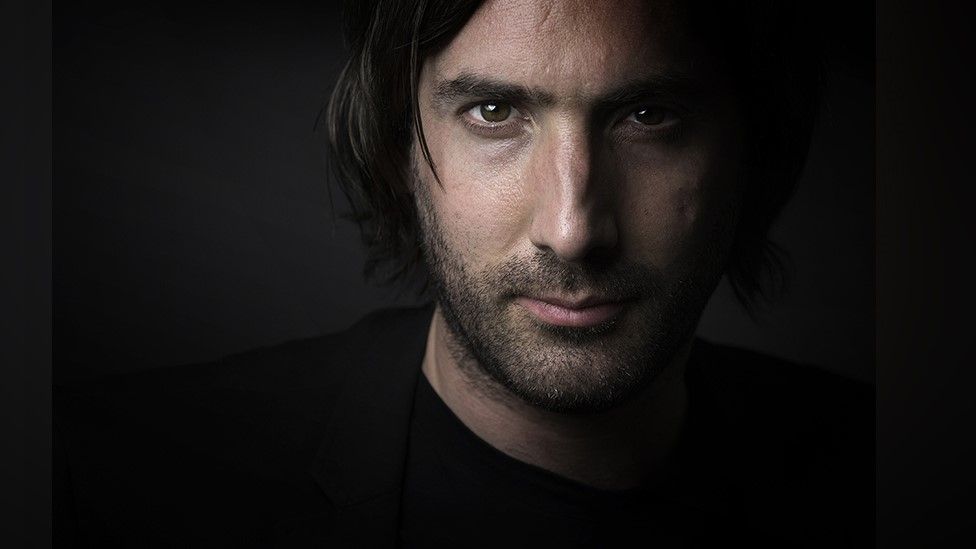
The author: Lynch was born in 1977. Prophet Song is his fifth novel – and he spent four years on it. He started just before his son was born and, by the time he finished, his boy was riding a bike.
Lynch says: “The spewing out of drafts is not for me. I write (mostly) five days a week, a few hundred careful words a day, often researching as I go, in a process whereby I edit as I write.”
The critics: The Guardian called it “a crucial book for our current times”. The Times Literary Supplement said it’s “thunderously powerful”.
The Irish Examiner described it as “a tremendous achievement, telling a dark story of a society’s descent into war that resonates far beyond Ireland… one of the most important novels of 2023”.
- Prophet Song by Paul Lynch wins 2023 Booker Prize
The Bee Sting – Paul Murray
The story: This epic page-turner is about a family derailing and the secrets they keep. It’s narrated at different times by all four members of the Barnes clan: car dealer, Dickie, his legendarily beautiful wife, Imelda, and their two children, Cass and PJ.
The reader’s perceptions constantly shift as we begin to see the world from their perspectives. Imelda Barnes (a fabulous creation) appears shallow and money-obsessed until we learn her backstory, a victim of violence and brutal poverty whose experience at her wedding to Dickie provides the Bee Sting of the book’s title.
It’s full of surprises and empathy, with laugh-out-loud moments and tear-jerking revelations – a joy to read.
The author: Murray was born in Dublin in 1975. His fourth novel The Bee Sting took him five years to write. Murray says: “once it’s rolling the process is pretty steady – I treat it like a regular job, show up at my desk from Monday to Friday week after week till it’s done”.
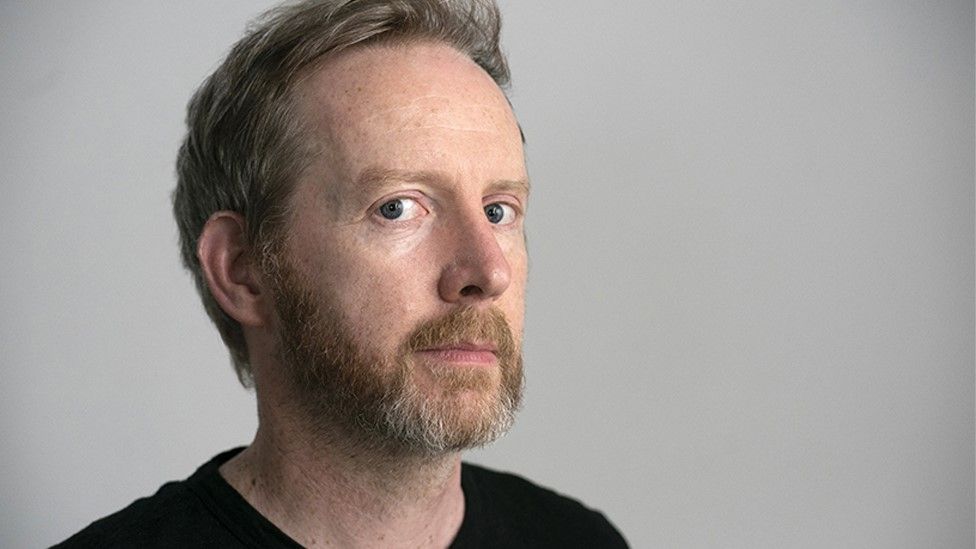
The critics: The Guardian said: “You won’t read a sadder, truer, funnier novel this year.” The Irish Times called it “a total ride of a book and justifies every single one of its glorious 646 pages”.
The Financial Times described The Bee Sting as “generous, immersive, sharp-witted and devastating; the sort of novel that becomes a friend for life”.
Study For Obedience – Sarah Bernstein
The story: Study for Obedience is an unsettling novel about a woman who moves to a remote country to become her brother’s housekeeper (creepily, she soaps his back as part of her duties and he only allows her to watch TV with the subtitles on).
Much is left unsaid. We don’t know her name or the country she lives in, the hostility and suspicion she receives from the locals feels almost medieval, but the setting is very modern.
It’s a short book, but you have to linger on every line. Bernstein was inspired by a quote from the renowned artist Paula Rego, who said the women in her paintings can be “obedient and murderous” at the same time. Adding anything else might give too much away.
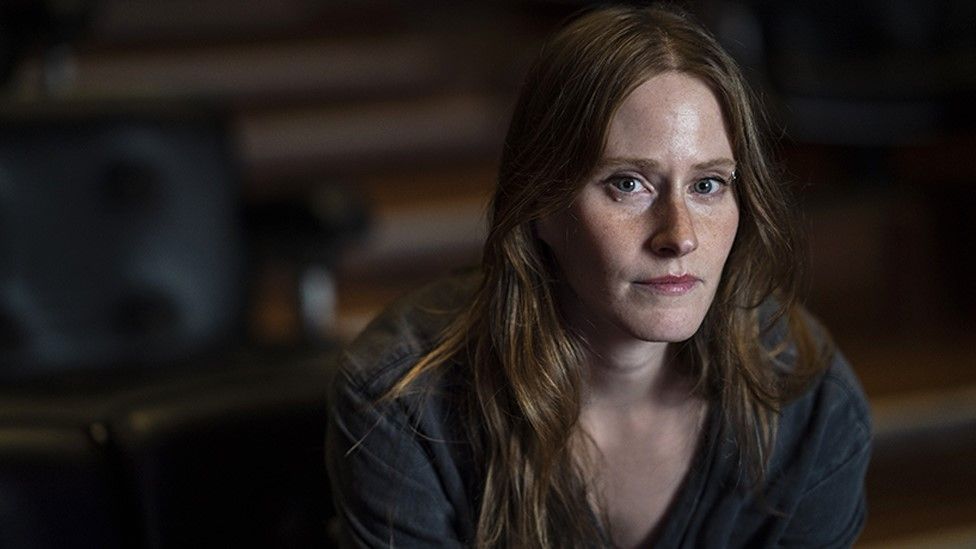
The author: Bernstein was born in Montreal in 1987 and now lives in the Scottish Highlands. She was named by Granta as one of Britain’s best British novelists under 40 earlier this year.
When she writes, she says: “I tend to approach things through the sound of a line – so it’s almost like catching a musical phrase, and then trying to follow the logic of its sound, rather than primarily its sense.”
The critics: The Telegraph called it “one of the year’s best novels”. The Financial Times said “the reader is utterly transported into Bernstein’s unsettling and unknowable worlds”.
The Times Literary Supplement said: “Bernstein’s chief brilliance in Study for Obedience is the subtlety with which she shifts our perception.”
If I Survive You – Jonathan Escoffery
The story: If I Survive You is a a series of eight linked stories, set mainly in Miami. This debut novel is primarily centred on Trelawny, the son of Jamaican immigrants. He falls out with his flawed father (father-son relationships are one of the themes explored in the novel). He’s a talented student who at one point finds himself homeless and living in his car.
It’s a painful and funny book about belonging and alienation with subtle and profound insights into the complicated experiences of black immigrants to the US.
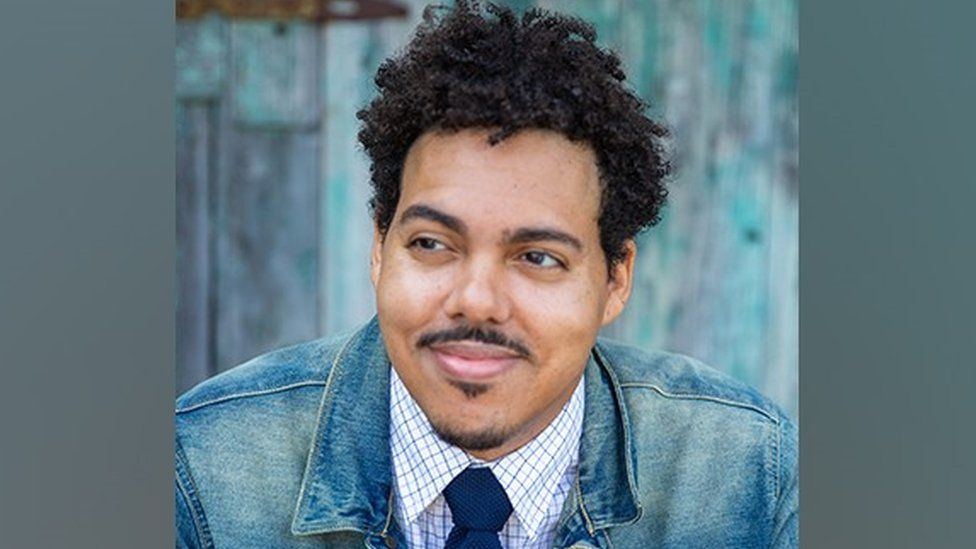
The author: Escoffery was born in 1980 in Miami, to where, like his character Trelawny, his parents had emigrated from Jamaica. He knew he wanted to be an author as soon as they started talking about careers at school. It took him around 10 years to write If I Survive You, with frequent pauses, as he tried to work out how to finance being a writer.
Escoffery says: “I don’t write much longhand, but I write a lot in my head and that’s what I did during those pauses. There were 50 or so drafts written.”
The critics: The Times Literary Supplement calls Escoffery “a supremely talented, funny writer whose light touch can enliven even the bleakest situation”.
The Washington Independent Review of Books called it a “stellar collection”, while the Los Angeles Times reviewer said what the book does “is promise more from a writer I can’t wait to see making books for a long, long time to come”.
Western Lane – Chetna Maroo
The story: The other debut novel on the list, Western Lane, looks at grief through the eyes of 11-year old, squash-obsessed Gopi. Her mother has died, her father is bereft, she and her sisters are dealing with loss in their own ways.
Gopi channels her feelings onto the squash court. It’s a coming-of-age story about adolescence, first love and sisterhood as well as a take on a family grappling with bereavement.
Tenderness spills from every page of this short book which makes the finale (sensed almost from the beginning) even more heartbreaking.
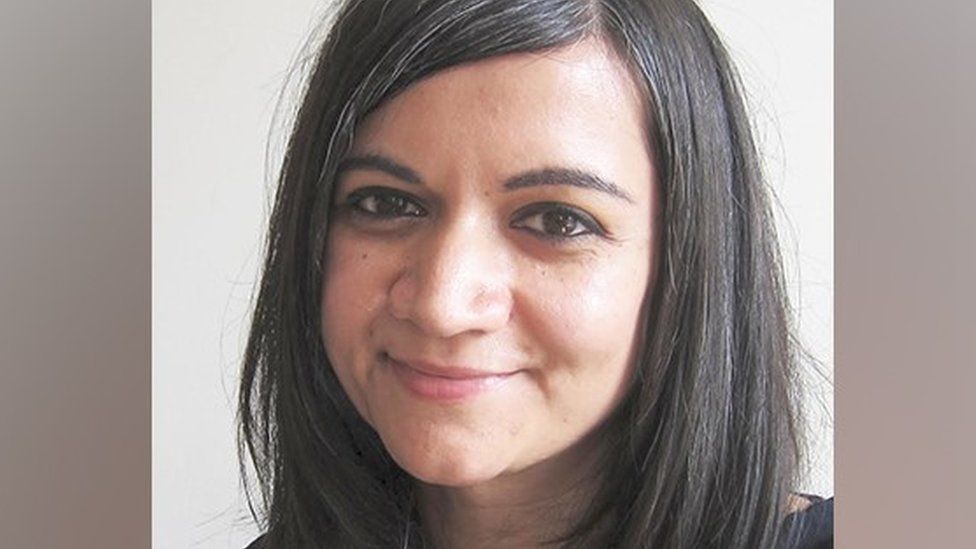
The author: Maroo was born in Kenya and lives in London. Previously an accountant, she created Western Lane in three years. “I write slowly, the first pages in longhand, then typing,” she says. “I usually try to get each sentence and paragraph sounding right before I go on, reading and editing from the beginning of the story.”
The critics: The Times said “with this gorgeous debut, Maroo blows most of the competition off the court”. Goodreads called it “a taut, enthralling first novel”.
Squash Magazine said: “It beautifully captures the dynamics of an Indian girl in a mostly white squash community… No book has perhaps ever had so many squash balls on its cover.”
This Other Eden – Paul Harding
The story: This Other Eden is a powerful, lyrical story set on an island off Maine, home to a community of freed slaves and other castaways.
It begins with a hurricane, but worse is to come as we reach the 20th Century and the state government decides forcibly to evict the island’s inhabitants. That decision to “cleanse” Apple Island, bigotry masquerading as eugenic pseudo-science, is based on shockingly real historical events.
This book is full of wonderful characters. Esther Honey recites from Hamlet and is raising three gifted grandchildren. Ethan Honey is a talented young artist who, because he can pass as white, is sent to the mainland in an effort to save him from the fate of the rest. But calamity is everywhere.
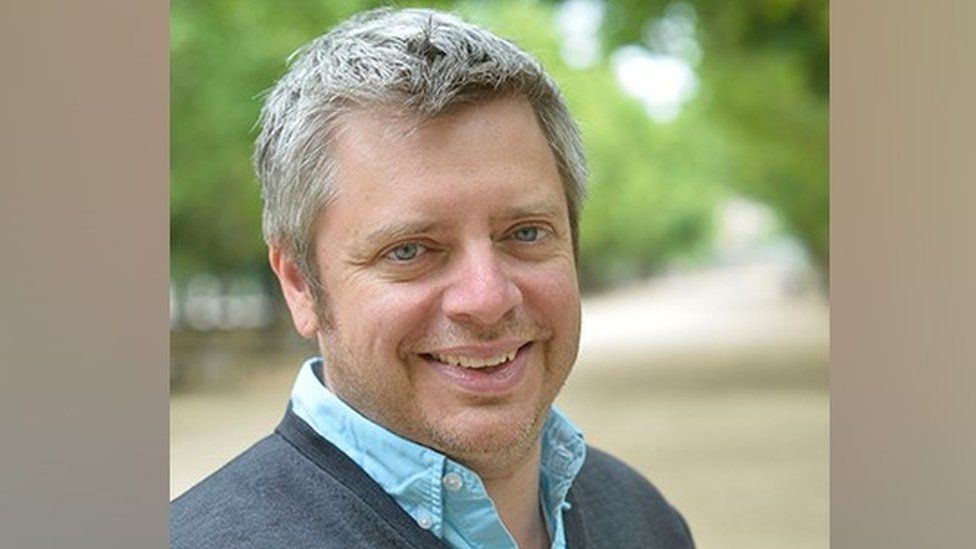
The author: Born in 1967, Harding lives on Long Island, New York. His debut novel Tinkers won the 2010 Pulitzer Prize. He often writes on post-it notes, a hangover from when he started out, and had to grab 10 minutes when he could.
He says: “I absolutely love writing without having any idea of what comes next… I’m like a magpie; I pick up whatever shiny or colourful bit of language that catches my attention and throw it into the kettle”.
The critics: The Scotsman called This Other Eden “a tragic tale beautifully told”, while the New York Times praised it for being “both devastating and meditative”.
The Sunday Times said This Other Eden “contains the ingredients of a riveting novel: expulsion, ambiguous identities, and evil scientists who imagine they are doing good… it is the attempt to ‘civilise’ that is the true act of savagery”.
Related Topics
- Literature
- Booker Prize
- Writing
- Books
-
Prophet Song by Paul Lynch wins 2023 Booker Prize
-
26 November 2023
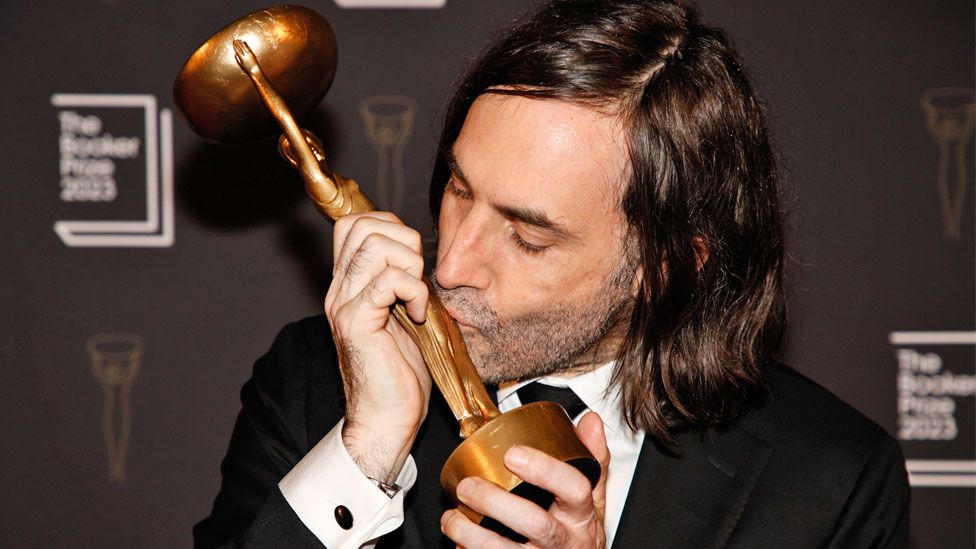
-
-
Booker short list made up of first-time nominees
-
21 September 2023

-
-
Sri Lankan author’s supernatural satire wins 2022 Booker
-
17 October 2022
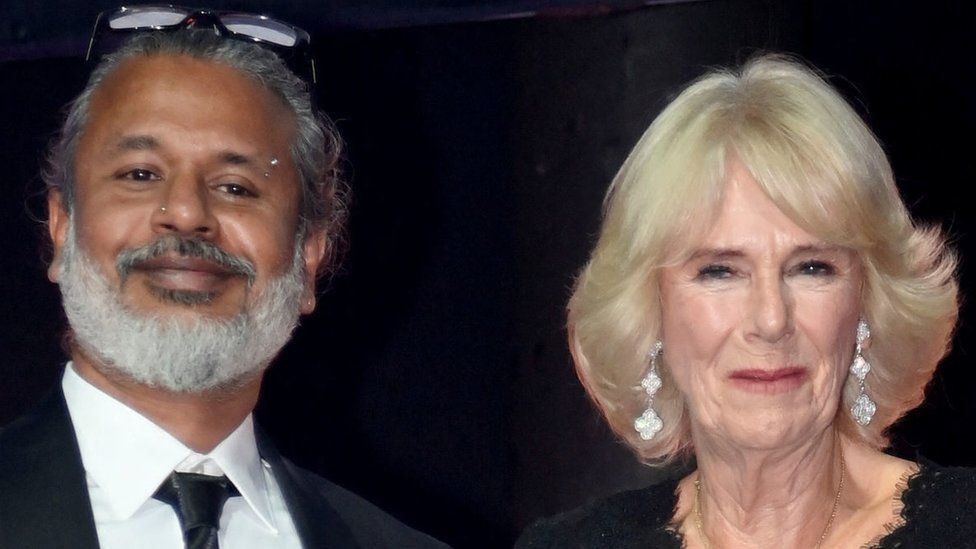
-